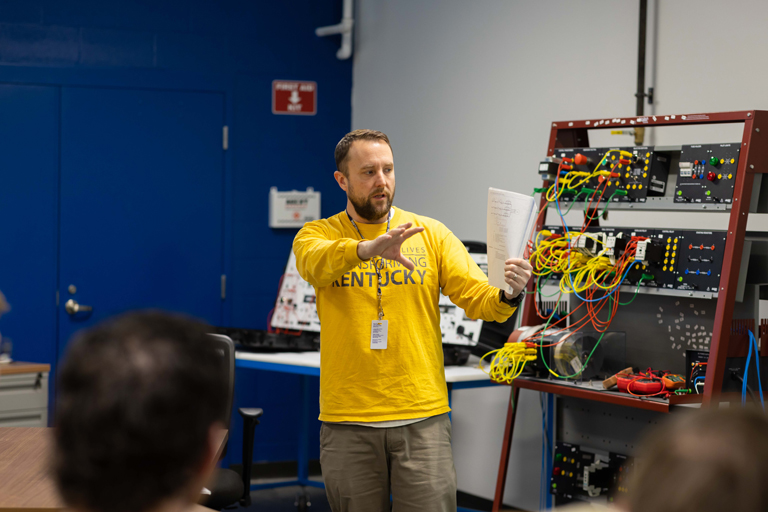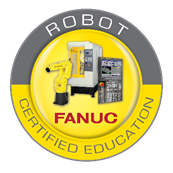Amp up your career and become an industrial or construction electrician.
What is Electrical Technology?
If you plan to work in industrial, commercial or residential electricity, then the Electrical Technology program is for you. This program will meet the training needs of two areas of concentration: Industrial Electrician or Construction Electrician.
You will learn electrical theory, industrial motor controls, programmable logic controllers, electrical panel building, pneumatic/hydraulic circuits, residential wiring, commercial wiring and electrical troubleshooting. Laboratory activities will give you the opportunity to work with installation projects, switching and control equipment, typically used in problem solving procedures, and the maintenance of electrical equipment.

What are my career choices?
Upon graduating from the Electrical Technology program, you will be ready for an entry level position in the industrial or construction trade. Employment opportunities are primarily with manufacturing, residential/commercial contractors and other various related fields.
Getting Started
What are my degree, diploma, and certificate options?
- Electrical Technology AAS - Construction Electrician Track
- Electrical Technology AAS - Electrical Technology Track
- Electrical Technology AAS - Industrial Electrician Track
- Automated Industrial Controls Technician Level I Certificate
- Automated Industrial Controls Technician Level II Certificate
- Construction Electrician Level I Certificate
- Construction Electrician Level II Certificate
- Construction Electrician Level III Certificate
- Industrial Electrician Level I Certificate
- Industrial Electrician Level II Certificate
Upon completion of this program, the graduate can:
- Compute resistance, current, voltage, and power in alternating circuits (AC) and direct current (DC).
- Connect a digital multi-meter to measure resistance, current, and voltage.
- Apply proper safety practices when working with electrical circuits.
- Solve electrical circuits using Ohm’s Law.
- Analyze, construct, and troubleshoot series circuits, parallel circuits, series-parallel circuits, capacitor circuits, and inductor circuits.
- Connect an oscilloscope to measure voltage and frequency.
- Identify and use basic hand tools.
- Compute and measure conductance and resistance of conductors and insulators.
- Compute and measure conductance and resistance of conductors and insulators.
- Connect and measure current and voltage for a three-phase transformer.
- Install and design circuits used in residential applications that meet the requirements of the local code or National Electric Code whichever is applicable.
- Install receptacles, ground fault circuit interrupters, lighting fixtures, smoke alarms, and appliance circuits.
- Install circuit breakers, arc fault circuit breakers, meter bases, service entrance equipment, underground services, and overhead services.
- Calculate and size wire using the National Electrical Code for residential applications.
- Install cables and wire used in residential applications using the appropriate wiring methods for the wire or cable being used.
- Install different type of conduit systems using the correct installation criteria for the type of conduit chosen in commercial and industrial applications.
- Compute the size of conductors needed in circuits used in commercial and industrial applications using the National Electric Code.
- Calculate the correct size of conduit needed for commercial and industrial applications.
- Install, test, and troubleshoot AC motors, DC motors, alternators, and generators.
- Design and wire motor control circuits using pushbuttons, limit switches, sensors, motor starters, relays, overloads, and over current protection devices.
- Install, test, and troubleshoot variable frequency drives.
- Install a programmable logic controller to control a motor.
- Program a programmable controller to control a motor.
- Troubleshoot a motor controls circuit using programmable logic controllers.
- Calculate solutions for right triangles using trigonometric functions and Pythagorean Theorem.
Upon completion of this program, the graduate can:
- Compute resistance, current, voltage, and power in alternating circuits (AC) and direct current (DC).
- Connect a digital multi-meter to measure resistance, current, and voltage.
- Apply proper safety practices when working with electrical circuits.
- Solve electrical circuits using Ohm’s Law.
- Analyze, construct, and troubleshoot series circuits, parallel circuits, series-parallel circuits, capacitor circuits, and inductor circuits.
- Connect an oscilloscope to measure voltage and frequency.
- Identify and use basic hand tools.
- Compute and measure conductance and resistance of conductors and insulators.
- Connect and measure current and voltage for a single-phase transformer.
- Connect and measure current and voltage for a three-phase transformer.
- Install and design circuits used in residential applications that meet the requirements of the local code or National Electric Code whichever is applicable.
- Install receptacles, ground fault circuit interrupters, lighting fixtures, smoke alarms, and appliance circuits.
- Install circuit breakers, arc fault circuit breakers, meter bases, service entrance equipment, underground services, and overhead services.
- Calculate and size wire using the National Electrical Code for residential applications.
- Install cables and wire used in residential applications using the appropriate wiring methods for the wire or cable being used.
- Install different type of conduit systems using the correct installation criteria for the type of conduit chosen in commercial and industrial applications.
- Compute the size of conductors needed in circuits used in commercial and industrial applications using the National Electric Code.
- Calculate the correct size of conduit needed for commercial and industrial applications.
- Install, test, and troubleshoot AC motors, DC motors, alternators, and generators.
- Design and wire motor control circuits using pushbuttons, limit switches, sensors, motor starters, relays, overloads, and over current protection devices.
- Calculate solutions for right triangles using trigonometric functions and Pythagorean Theorem.
How Do I Pay For This?
Worry no more. With the lowest tuition in Kentucky, financial aid options, and a helping hand to guide you through the application process, MCTC has you covered. MCTC will help you reach your goals at a price that won't break the bank.
What Else Do I Need to Know?
Length of Program
You can earn an associate in applied science degree in two years if you maintain full-time status.
This information should not be considered a substitute for the KCTCS Catalog. You should always choose classes in collaboration with your faculty advisor to ensure that you meet all degree requirements.
FANUC Provider


